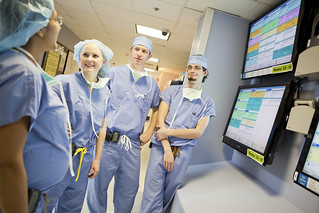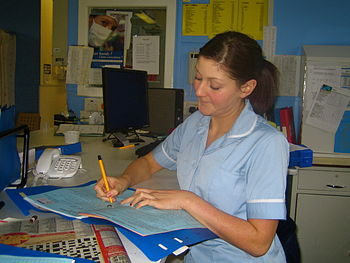| Nursing Magnet Application Send-Off (Photo credit: Christiana Care) |
Long regarded as being key front line personnel, nurses have been an invaluable component in most
To be clear, Advanced Practice Registered Nurses (APRNs) currently include Nurse Practitioners, Clinical Nurse Specialists, Nurse Mid-Wives, and Nurse Anesthetists. APRNs must complete a master’s or doctorate level nurse practitioner degree, and national certification before being eligible to work in clinical, education or administrative settings as an APRN.
APRNs' responsibilities are numerous and varied. In clinical practices, APRNs take medical histories; conduct physical exams; order tests; perform minor procedures such as suturing, removing small lesions, incision and drainage of wounds, etc.; make diagnoses; and implement treatment plans.They are also permitted to interpret lab results, X-rays and other diagnostic tools, and can write prescriptions for medication and medical devices if they have a Drug Devise Furnishing certificate (NFP). Increasingly, prevention and wellness are important aspects of ARPNs' practice as they counsel and teach patients about their health, making recommendations on how to improve it, and to prevent disease. APRNs can admit seriously ill patients to hospitals, and increasingly, some even have hospital privileges.
| Native Americans at dedication (Photo credit: The Library of Congress) |
Perhaps more so than any other health care profession (that is discounting actual physicians and surgeons) APRNs' requisite post-baccalaureate degrees offer more areas of health care in which an APRN can specialize than any other, such as pediatrics, family health, women’s health and ob/gyn, sports medicine, surgery, oncology, orthopedics, geriatric health, psychiatric, forensic, palliative (hospice), acute care, etc. It’s been said that next to becoming a lawyer, the APRN is one of the most flexible, comprehensive, and powerful degrees offered today. No wonder the job outlook for APRNs is in the top 20 for nearly all professions, not just in health care.
| Graduate Nursing Education (OB/GYN) (Photo credit: Mercy Health) |
APRNs are leaders within the overall model of health care delivery, hence cultivating strong skills in that area is important. When an APRN walks into a room to consult with a patient and/or their significant others, all eyes are on them. In this age of virtually limitless information via the Internet, an APRN's knowledge about their patients’ condition, prognosis, treatment plan, instructions, prescriptions, etc., must be spot on. While being compassionate health care providers — as with many specialists in the field — the APRN must keep her/his emotions in check, not only to be perceived as professional and to help patients deal with challenges and issues that could affect their health and lives, but also for one’s own piece of mind.
| Nurse in nurses' station. (Photo credit: Wikipedia) |
As with many fields in health care, APRN is a profession that demands lifelong learning and professional excellence.
Educational Requirements
Currently, to become an APRN, one must have a Bachelor of Science in Nursing and generally, a master’s degree, and national certification. Some APRNs advance their education even further, by obtaining a doctorate degree. I know a highly intelligent and motivated APRN, who, after getting her master’s degree in nursing, then went on to obtain her Juris Doctor (JD). Another went back to obtain his MBA.
Importantly, there is a major educational initiative by the American Association of Colleges of Nursing (AACN) that will soon change the educational requirements of an APRN. The AACN has called for moving the level of preparation for the APRN from the master’s degree to the doctorate level by 2015. As stated by the AACN in its watermark decision, “The changing demands of the nation's complex health care environment require that nurses serving in specialty positions have the highest level of scientific knowledge and practice expertise possible. Research … has established a clear link between higher levels of nursing education and better patient outcomes. Currently, Medicine (MD), Dentistry (DDS), Pharmacy (PharmD), Psychology (PsyD), Physical Therapy (DPT) and Audiology (AudD) all offer practice doctorates; now nursing is moving in the direction of these other health care professionals, as it transitions to the Doctor of Nurse Practitioner (DNP)."
The DNP prepares nurses to assume such roles as:
- Developer/Evaluator of health care programs
- Health Care Entrepreneur/Executive
- Clinical Administrator
- Clinical Nurse Educator
- Clinician-Scholar
| Harkness Tower, situated in the Memorial Quadrangle at Yale (Photo credit: Wikipedia) |
In this article I gave an overview of Advanced Practice Nurse Practitioners (APRNs), and discussed their job requirements, responsibilities, areas and different types of practices. I also talked about some of the professional and personal characteristics that make for a qualified APRN. Lastly, I talked about the APRN’s educational requirements, and the new changes that will be enacted next year regarding their advanced degree prerequisite, namely moving from a master’s to a doctorate degree. If you’d like to make a comment about this article, please post below. If you found this article informative and helpful, please pass it along.
Rick Fromme combines entrepreneurial enthusiasm with an insider's knowledge of the medical industry to co-found MedMasters.com. Both his drive and perspective helps provide health care professionals with a superior mechanism with which to communicate, network and market their strengths. Prior to founding MedMasters.com, Rick operated a highly successful medical device distributorship. Other milestones in his 12-year career in the medical industry include a key position at a medical device start-up company that was later sold to the Ethicon Endo division of Johnson & Johnson. You may reach Rick by connecting with him on Facebook, Twitter, Google+, LinkedIn and YouTube.














This comment has been removed by the author.
ReplyDeleteAPRNs are highly qualified health care pros. They and PAs will be at the forefront of our health care reform system as primary care providers in the near future.
DeleteWow, the things an APRN goes through on a daily basis. Amazing! :D
ReplyDeleteIt's amazing how much the medical profession has come to rely on nurses. Anyone who has ever stayed in a hospital knows that 90% of their care comes from nurses.
ReplyDelete